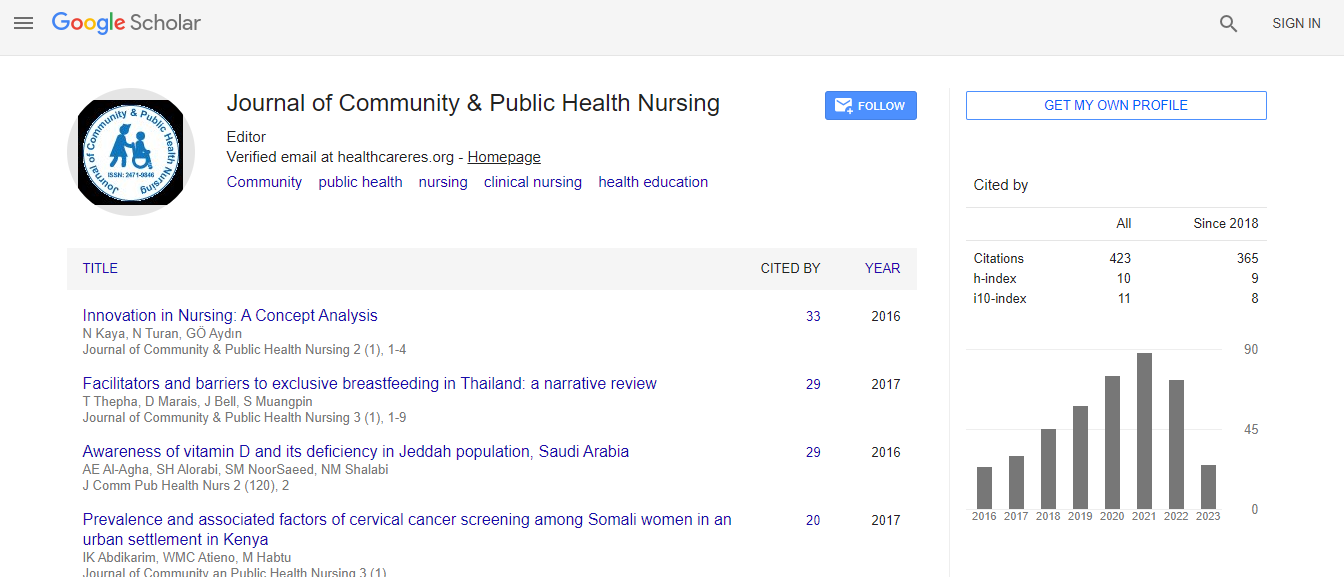Our Group organises 3000+ Global Conferenceseries Events every year across USA, Europe & Asia with support from 1000 more scientific Societies and Publishes 700+ Open Access Journals which contains over 50000 eminent personalities, reputed scientists as editorial board members.
Open Access Journals gaining more Readers and Citations
700 Journals and 15,000,000 Readers Each Journal is getting 25,000+ Readers
Google Scholar citation report
Citations : 739
Journal of Community & Public Health Nursing received 739 citations as per Google Scholar report
Journal of Community & Public Health Nursing peer review process verified at publons
Indexed In
- Google Scholar
- CiteFactor
- RefSeek
- Hamdard University
- EBSCO A-Z
- OCLC- WorldCat
- Publons
- Geneva Foundation for Medical Education and Research
- ICMJE
Useful Links
Recommended Journals
Related Subjects
Share This Page
Working conditions of hospital nurses: A comparative study between Mongolian and Japanese nurses
7th International Conference on Public Health and Nursing
Ayako Okutsu, Tomomi Ota, Yukiko Saikawa, Akiko Hoshino and Toshiki Katsura
Kansai University of Nursing and Health Sciences, JapanKyoto Prefectural University of Medicine, Japan
Posters & Accepted Abstracts: J Comm Pub Health Nurs
Abstract
Purpose: This study examines the working conditions and problems of Mongolian hospitals by comparing the working conditions of Mongolian nurses with Japanese ones. Methods: Settings and participants: Survey data were collected from randomly selected 200 nurses (100 were Mongolians and the other 100 were Japanese) who agreed to participate in the survey. All of our participants were working in a hospital that possesses up to 500 hospital beds. Data were collected through a self-administered survey questionnaire. Survey items were nurses’ demographics and the criteria for work and job satisfaction. Collected data were analyzed by t-test and Wilcoxon Rank Sum test. Ethical considerations: This study was approved by the ethical committee of Mongolian hospitals, Japanese Hospitals and the Ministry of Health Mongolia. Results: Average age of nurses in Mongolia was significantly younger than Japanese nurses’ one. Consequently, average year of work experience of Mongolian nurses is shorter than Japanese one. However, Japanese nurses have family members who need child care or nursing care at a higher rate than Mongolian nurses. Work and job satisfaction of Japanese nurses about their work and job status was significantly higher than Mongolian nurses’ one. However, the opposite result was found in the job satisfaction about their workload. Discussion: Mongolian nurses are younger than their Japanese counterparts. Thus, Mongolian nurses presumably have more stamina and energy than their Japanese counterparts. Stamina and energy are absolutely essential to withstanding the strains of nursing. Young nurses often have a significant advantage in learning techniques as well. Mongolian nurses were less satisfied with their “occupational status” than their Japanese counterparts. That said, Japanese nurses also had a low social status. Public awareness of the substantial role nurses play in hospital administration will probably take some time to take root.Biography
Ayako Okutsu is completed his/her Ph D from Kansai University of Nursing and Health Sciences, Japan
E-mail: a.okutsu@kki.ac.jp

 Spanish
Spanish  Chinese
Chinese  Russian
Russian  German
German  French
French  Japanese
Japanese  Portuguese
Portuguese  Hindi
Hindi 
